Finland men's national ice hockey team
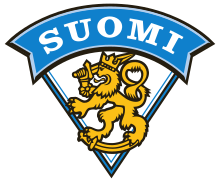 | |
| Nickname(s) | Leijonat / Lejonen (The Lions) |
|---|---|
| Association | Finnish Ice Hockey Association |
| Head coach | Jukka Jalonen |
| Assistants | Kari Lehtonen Mikko Manner Ari-Pekka Selin |
| Captain | Marko Anttila |
| Most games | Raimo Helminen (331) |
| Most points | Raimo Helminen (207) |
| Team colors | |
| IIHF code | FIN |
 | |
| Ranking | |
| Current IIHF | 2 |
| Highest IIHF | 1 (first in 2011 and in 2019) |
| Lowest IIHF | 7 (2005) |
| First international | |
| Finland (Helsinki, Finland; 29 January 1928) Finland (Helsinki, Finland; 20 February 1937) | |
| Biggest win | |
| Finland (Hämeenlinna, Finland; 12 March 1947) | |
| Biggest defeat | |
| Canada (Oslo, Norway; 3 March 1958) | |
| IIHF World Championships | |
| Appearances | 63 (first in 1939) |
| Best result | |
| World Cup / Canada Cup | |
| Appearances | 7 (first in 1976) |
| Best result | |
| Olympics | |
| Appearances | 14 (first in 1952) |
| Medals | |
| Medal record | ||
|---|---|---|
| Olympic Games | ||
| 1988 Calgary | Team | |
| 2006 Turin | Team | |
| 1994 Lillehammer | Team | |
| 1998 Nagano | Team | |
| 2010 Vancouver | Team | |
| 2014 Sochi | Team | |
| World Cup / Canada Cup | ||
| 2004 Toronto | ||
| 1991 Hamilton | ||
| World Championship | ||
| 1995 Sweden | ||
| 2011 Slovakia | ||
| 2019 Slovakia | ||
| 1992 Czechoslovakia | ||
| 1994 Italy | ||
| 1998 Switzerland | ||
| 1999 Norway | ||
| 2001 Germany | ||
| 2007 Russia | ||
| 2014 Belarus | ||
| 2016 Russia | ||
| 2021 Latvia | ||
| 2000 Russia | ||
| 2006 Latvia | ||
| 2008 Canada | ||
| European Championship | ||
| 1962 United States | ||
| 1985 Czechoslovakia | ||
| 1986 Soviet Union | ||
| 1987 Austria | ||
| 1991 Finland | ||
| Winter Universiade | ||
| 1981 Jaca | ||
| 1997 Muju-Jeonju | ||
| 1970 Rovaniemi | ||
| 1985 Belluno | ||
| 1989 Sofia | ||
| 1991 Sapporo | ||
| 2005 Innsbruck | ||
The Finnish men's national ice hockey team, or Leijonat / Lejonen ("The Lions" in Finnish and Swedish), as it is called in Finland, is governed by the Finnish Ice Hockey Association. Finland is one of the most successful national ice hockey teams in the world and a member of the so-called "Big Six", the unofficial group of the six strongest men's ice hockey nations, along with Canada, United States, the Czech Republic, Russia and Sweden.
Finland won the world championship title in 2019, their third after 1995 and 2011. A duo of silver medals (1988, 2006) remain the country's best Olympic result. At the Canada/World Cup, their best achievement is also a silver medal which they won in 2004.
History[]
Finland's first appearance in an elite ice hockey competition was at 1939 Ice Hockey World Championships in Switzerland. The end result was shared last place with Yugoslavia. After 10 years later, Finland came to 1949 Ice Hockey World Championships at Sweden. The Finns finished 7th place by winning the Consolation Round. Finland's first appearance in an Winter Olympics was 1952 Oslo.
In the 1974 Men's World Ice Hockey Championships two players were suspended for doping. They were the Swede Ulf Nilsson and the Finn Stig Wetzell who failed a drug test for the forbidden substance ephedrine. Both players were suspended for the rest of the tournament. Nilsson failed the test after Sweden's game against Poland, which Sweden won 4–1. The game was awarded to Poland as a 5–0 forfeit. The Finn, Wetzell, failed the test after Finland's match against Czechoslovakia, which Finland won 5–2, which was also awarded to Czechoslovakia as a 5–0 forfeit. The Finns were able to defeat Czechoslovakia again on the last day, which would have earned their first medal in history, if not for the points lost in the forfeited win.
Finland was close again to winning the first medal of its history in the 1986 Men's World Ice Hockey Championships, when it led 4–2 in the final minute of the medal round match against Sweden. However, in the last minute of the match Anders "Masken" Carlsson first narrowed the goal to the end and even leveled the match with the help of the Finns' mistake. The match finally ended in a 4–4 draw, Finland's ranking in the tournament was fourth place.
At the 1992 Men's Ice Hockey World Championships, Finland's success and silver medal came as a surprise to many Finns, as the team was not expected to much because of inexperience and the poor success of the (1992 Albertville Winter Olympics) in the same year. The medal achieved in the tournament was the first World Championship medal and the second value medal after (1988 Calgary Winter Olympics).
In the 1995 Men's World Ice Hockey Championships, Finland achieved its first ever gold in international ice hockey. Finland reached the final with a 5–0 victory over France in the quarterfinals, and a 3–0 victory over the Czech Republic in the semi-finals. In the finals, the Finns faced off against their hockey rivals and host of the 1995 tournament, Sweden. In the first period of the final, left wing Ville Peltonen scored a natural hat trick, and then assisted on Timo Jutila's first period goal to give Finland a 4–0 lead, on the way to an eventual 4–1 victory.
At the 1998 Olympic men's ice hockey tournament, Team Finland came away with Bronze, after defeating Canadian national team 3–2. Teemu Selänne led the tournament in goals scored (4) and total points achieved (10). The tournament was the first in which professional players from the National Hockey League (NHL) were allowed to participate, allowing national teams to be constructed using the best possible talent from each country. The 1998 Olympic tournament therefore came to be known as the "Tournament of the Century".

At the 2006 IIHF World Championship, Finland achieved 3rd place winning the bronze medal game against Canada. Petteri Nummelin was named to the Media All-Star team.
In the 2006 Winter Olympics, Finland won a silver medal, coming close to winning in the final but losing 3–2 to Sweden. Finland's goaltender Antero Niittymäki was named the MVP of the tournament (only 8 goals against in the whole tournament) and Teemu Selänne was voted best forward. The format was changed from the 1998 and 2002 tournaments, to a format similar to the 1992 and 1994 tournaments. The number of teams was reduced from 14 to 12. The 12 teams were split into two groups in the preliminary stage, which followed a round robin format. Each team played the other teams in their group once. The top four teams from each group advanced to the quarter-finals.
At the 2007 IIHF World Championship, Finland lost the finals to Canada's national team. The final marked the second time that Finland and Canada met in the final of a World Championship, the first time being in 1994. However, only a year before in 2006 Finland had defeated Canada 5–0 in the bronze medal game. In 2007, Canada were looking on form, being undefeated coming into the playoff round, while Finland had registered two losses in the run-up to the finals. Rick Nash scored on the powerplay at 6:10 into the first period on a one-timer from the point from a pass by Cory Murphy off of Matthew Lombardi, to put Canada up 1–0. Near the middle of the period, Eric Staal scored in similar fashion also on the powerplay, assisted by Justin Williams, and Mike Cammalleri. 9:11 into the second period, Colby Armstrong scored to give the Canadians a 3–0 lead. This goal ended up as the game winner. Finland had some discipline difficulty in the first two periods, taking 6 minutes apiece in penalties in both periods. Finland started to bring up the pressure in the last ten minutes, and Petri Kontiola scored a nice glove-side goal on Ward at 51:08 assisted by Ville Peltonen, to put the Finns on the board. Only with 3 minutes left Antti Miettinen scored to bring Finland within one, 3–2. However, only one minute later Rick Nash scored on a skillful breakaway to put the game away, 4–2 final for team Canada. The Canadians were outshot 22–18, but the Canadian goaltender, Cam Ward, kept them in the game as he was solid between the pipes. They also were able to capitalize on the powerplay, which ended up being decisive in the Canadian win. Kari Lehtonen was voted Tournament's best goaltender. At the 2008 IIHF World Championship, Finland achieved 3rd place winning the Bronze medal 4–0 against Sweden's national team.
At the 2010 Winter Olympics, Finland came away with 3rd place winning 5–3 against team Slovakia. During the tournament, Teemu Selänne of Finland became the all-time leader for points scored in the Olympics.[2][3] He notched an assist in his second game of the tournament for 37 career points, surpassing Valeri Kharlamov of the Soviet Union, Vlastimil Bubník of Czechoslovakia, and Harry Watson of Canada.[2][3]
At the 2011 IIHF World Championship, Finland won its second World Championship, beating the Swedish national team by a score of 6–1. As two highly ranked neighboring countries, Sweden and Finland have a long-running competitive tradition in ice hockey. Before the game, mainstream media in both countries titled the match "a dream final".[4][5] After a goalless first period, Sweden opened the game with a 1–0 goal by Magnus Pääjärvi in the second period at 27:40. Seven seconds before the period's end, Finland's Jarkko Immonen scored to tie the game 1–1. Finland took the lead early in the third period, scoring two goals at 42:35 and 43:21 by Nokelainen and Kapanen. Sweden took a time-out before the last period's half but did not manage to regroup, and the tournament was decided by a clear 6–1 victory to Finland by Janne Pesonen's, Mika Pyörälä's and Pihlström goals.[6] Team Finland's Jarkko Immonen led the Tournament in both goals and points scored with 9 and 12 respectively.
In recent years, Finland has been consistently ranked among the best teams in international hockey. Currently the team is ranked 3rd (26 May 2019) in the IIHF World Ranking. Finland won their third World Championship title at the 2019 IIHF World Championship in Slovakia.
Tournament record[]
Olympic Games[]
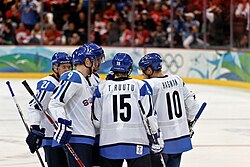
| Games | GP | W | L | T | GF | GA | Coach | Captain | Finish | ||||||
|---|---|---|---|---|---|---|---|---|---|---|---|---|---|---|---|
| was not involved | - | ||||||||||||||
| – | |||||||||||||||
| – | |||||||||||||||
| – | |||||||||||||||
| – | |||||||||||||||
| – | |||||||||||||||
| 8 | 2 | 6 | 0 | 21 | 60 | Aarne Honkavaara | 7th | ||||||||
| Did not compete | |||||||||||||||
| 6 | 3 | 2 | 1 | 55 | 23 | Yrjö Hakala | 7th | ||||||||
| 8 | 3 | 5 | 0 | 18 | 33 | Raimo Kilpiö | 6th | ||||||||
| 8 | 4 | 3 | 1 | 28 | 25 | Matti Reunamäki | 5th | ||||||||
| 6 | 3 | 3 | 0 | 27 | 25 | Seppo Liitsola | Lasse Oksanen | 5th | |||||||
| 6 | 3 | 3 | 0 | 30 | 20 | Seppo Liitsola | Seppo Lindström | 4th | |||||||
| 7 | 3 | 3 | 1 | 31 | 25 | Kalevi Numminen | Tapio Levo | 4th | |||||||
| 6 | 2 | 3 | 1 | 31 | 26 | Alpo Suhonen | Anssi Melametsä | 6th | |||||||
| 8 | 5 | 2 | 1 | 34 | 14 | Pentti Matikainen | Timo Blomqvist | ||||||||
| 8 | 4 | 3 | 1 | 29 | 11 | Pentti Matikainen | Pekka Tuomisto | 7th | |||||||
| 8 | 7 | 1 | 0 | 38 | 10 | Timo Jutila | |||||||||
| 6 | 3 | 3 | 0 | 20 | 19 | Hannu Aravirta | Saku Koivu | ||||||||
| 4 | 2 | 2 | 0 | 12 | 10 | Hannu Aravirta | Teemu Selänne | 6th | |||||||
| 8 | 7 | 1 | 0 | 29 | 8 | Erkka Westerlund | Saku Koivu | ||||||||
| 6 | 4 | 2 | 0 | 19 | 13 | Jukka Jalonen | Saku Koivu | ||||||||
| 6 | 4 | 1 | 1 | 24 | 10 | Erkka Westerlund | Teemu Selänne | ||||||||
| 5 | 3 | 0 | 2 | 16 | 9 | Lauri Marjamäki | Lasse Kukkonen | 6th | |||||||
| Jukka Jalonen | |||||||||||||||
| To be determined | |||||||||||||||
| Games | Gold | Silver | Bronze | Total |
|---|---|---|---|---|
| 16 | 0 | 2 | 4 | 6 |
World Championship[]

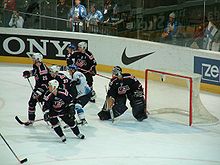
| Year | Location | Coach | Captain | Result |
|---|---|---|---|---|
| 1939 | Zürich / Basel, |
13th place | ||
| 1949 | Stockholm, |
Keijo Kuusela | 7th place | |
| 1951 | Paris, |
Keijo Kuusela | 7th place | |
| 1954 | Stockholm, |
Matti Rintakoski | 6th place | |
| 1955 | Krefeld / Dortmund / Cologne, West Germany |
Aarne Honkavaara | Matti Rintakoski | 9th place |
| 1957 | Moscow, |
Aarne Honkavaara | Yrjö Hakala | 4th place |
| 1958 | Oslo, |
Aarne Honkavaara | Yrjö Hakala | 6th place |
| 1959 | Prague / Bratislava, |
Yrjö Hakala | 6th place | |
| 1961 | Geneva / Lausanne, |
Erkki Koiso | 7th place | |
| 1962 | Colorado Springs / Denver, |
Teppo Rastio | 4th place | |
| 1963 | Stockholm, |
Esko Luostarinen | 5th place | |
| 1965 | Tampere, |
Raimo Kilpiö | 7th place | |
| 1966 | Ljubljana, |
Lalli Partinen | 7th place | |
| 1967 | Vienna, |
Matti Reunamäki | 6th place | |
| 1969 | Stockholm, |
Juhani Wahlsten | 5th place | |
| 1970 | Stockholm, |
Seppo Liitsola | Lasse Oksanen | 4th place |
| 1971 | Bern / Geneva, |
Seppo Liitsola | Lasse Oksanen | 4th place |
| 1972 | Prague, |
Seppo Liitsola | Lasse Oksanen | 4th place |
| 1973 | Moscow, |
Veli-Pekka Ketola | 4th place | |
| 1974 | Helsinki, |
Kalevi Numminen | Veli-Pekka Ketola | 4th place |
| 1975 | Munich / Düsseldorf, |
Seppo Liitsola | Seppo Lindström | 4th place |
| 1976 | Katowice, |
Seppo Liitsola | Lasse Oksanen | 5th place |
| 1977 | Vienna, |
Lasse Heikkilä | Pertti Koivulahti | 5th place |
| 1978 | Prague, |
Kalevi Numminen | Seppo Repo | 7th place |
| 1979 | Moscow, |
Kalevi Numminen | Juhani Tamminen | 5th place |
| 1981 | Gothenburg / Stockholm, |
Kalevi Numminen | Juhani Tamminen | 6th place |
| 1982 | Helsinki / Tampere, |
Alpo Suhonen | Juhani Tamminen | 5th place |
| 1983 | Düsseldorf / Dortmund / Munich, West Germany |
Alpo Suhonen | Pekka Rautakallio | 7th place |
| 1985 | Prague, |
Alpo Suhonen | Anssi Melametsä | 5th place |
| 1986 | Moscow, |
Rauno Korpi | Kari Makkonen | 4th place |
| 1987 | Vienna, |
Rauno Korpi | 5th place | |
| 1989 | Stockholm / Södertälje, |
Pentti Matikainen | Timo Blomqvist | 5th place |
| 1990 | Bern / Fribourg, |
Pentti Matikainen | Arto Ruotanen | 6th place |
| 1991 | Turku / Helsinki / Tampere, |
Pentti Matikainen | Hannu Virta | 5th place |
| 1992 | Prague / Bratislava, |
Pentti Matikainen | Pekka Tuomisto | Silver |
| 1993 | Dortmund / Munich, |
Pentti Matikainen | Timo Jutila | 7th place |
| 1994 | Bolzano / Canazei / Milano, |
Timo Jutila | Silver | |
| 1995 | Stockholm / Gävle, |
Timo Jutila | Gold | |
| 1996 | Vienna, |
Timo Jutila | 5th place | |
| 1997 | Helsinki / Turku / Tampere, |
Timo Jutila | 5th place | |
| 1998 | Zürich / Basel, |
Hannu Aravirta | Ville Peltonen | Silver |
| 1999 | Oslo / Lillehammer / Hamar, |
Hannu Aravirta | Saku Koivu | Silver |
| 2000 | Saint Petersburg, |
Hannu Aravirta | Raimo Helminen | Bronze |
| 2001 | Cologne / Hanover / Nuremberg, |
Hannu Aravirta | Petteri Nummelin | Silver |
| 2002 | Gothenburg / Karlstad / Jönköping, |
Hannu Aravirta | Raimo Helminen | 4th place |
| 2003 | Helsinki / Tampere / Turku, |
Hannu Aravirta | Saku Koivu | 5th place |
| 2004 | Prague / Ostrava, |
Raimo Summanen | Olli Jokinen | 6th place |
| 2005 | Innsbruck / Vienna, |
Erkka Westerlund | Ville Peltonen | 7th place |
| 2006 | Riga, |
Erkka Westerlund | Ville Peltonen | Bronze |
| 2007 | Moscow / Mytishchi, |
Erkka Westerlund | Ville Peltonen | Silver |
| 2008 | Quebec City / Halifax, |
Ville Peltonen | Bronze | |
| 2009 | Bern / Kloten, |
Jukka Jalonen | Sami Kapanen | 5th place |
| 2010 | Cologne / Mannheim / Gelsenkirchen, |
Jukka Jalonen | Sami Kapanen | 6th place |
| 2011 | Bratislava / Košice, |
Jukka Jalonen | Mikko Koivu | Gold |
| 2012 | Helsinki, |
Jukka Jalonen | Mikko Koivu | 4th place |
| 2013 | Stockholm, |
Jukka Jalonen | Lasse Kukkonen | 4th place |
| 2014 | Minsk, |
Erkka Westerlund | Olli Jokinen | Silver |
| 2015 | Prague / Ostrava, |
Kari Jalonen | Jussi Jokinen | 6th place |
| 2016 | Moscow / Saint Petersburg, |
Kari Jalonen | Mikko Koivu | Silver |
| 2017 | Cologne, |
Lauri Marjamäki | Lasse Kukkonen | 4th place |
| 2018 | Copenhagen / Herning, |
Lauri Marjamäki | Mikael Granlund | 5th place |
| 2019 | Bratislava / Košice, |
Jukka Jalonen | Marko Anttila | Gold |
| 2020 | Zürich / Lausanne, |
Cancelled[7] | ||
| 2021 | Riga, |
Jukka Jalonen | Marko Anttila | Silver |
| 2022 | Tampere / Helsinki, |
Jukka Jalonen | ||
Canada Cup / World Cup[]
| Year | Coach | Captain | Finish | Rank |
|---|---|---|---|---|
| 1976 | Lasse Heikkilä | Veli-Pekka Ketola | Round-robin | 6th |
| 1981 | Kalevi Numminen | Veli-Pekka Ketola | Round-robin | 6th |
| 1987 | Rauno Korpi | Jari Kurri | Round-robin | 6th |
| 1991 | Pentti Matikainen | Jari Kurri | Semi-final |
| Year | GP | W | OW | T | OL | L | GF | GA | Coach | Captain | Finish | Rank |
|---|---|---|---|---|---|---|---|---|---|---|---|---|
| 1996 | 4 | 2 | – | 0 | – | 2 | 17 | 16 | Jari Kurri | Quarter-final | 5th | |
| 2004 | 6 | 4 | 0 | 1 | 0 | 1 | 17 | 9 | Raimo Summanen | Saku Koivu | Final | |
| 2016 | 3 | 0 | 0 | – | 0 | 3 | 1 | 9 | Lauri Marjamäki | Mikko Koivu | Group stage | 8th |
Euro Hockey Tour[]
- 1996–97 – Finished in

- 1997–98 – Finished in

- 1998–99 – Finished in

- 1999–00 – Finished in

- 2000–01 – Finished in

- 2001–02 – Finished in

- 2002–03 – Finished in

- 2003–04 – Finished in

- 2004–05 – Finished in

- 2005–06 – Finished in

- 2006–07 – Finished in 4th
- 2007–08 – Finished in

- 2008–09 – Finished in

- 2009–10 – Finished in

- 2010–11 – Finished in

- 2011–12 – Finished in

- 2012–13 – Finished in

- 2013–14 – Finished in

- 2014–15 – Finished in

- 2015–16 – Finished in

- 2016–17 – Finished in

- 2017–18 – Finished in

- 2018–19 – Finished in

- 2019–20 – Finished in

- 2020–21 – Finished in 4th
EHT Medal table[]
| Gold | Silver | Bronze | Medals |
|---|---|---|---|
| 9 | 7 | 6 | 22 |
Tournament summary[]
- Karjala Tournament:
- Channel One Cup / Izvestia Trophy:
- Sweden Hockey Games:
 Gold medal (, , , 2010, 2013, 2014, 2018)
Gold medal (, , , 2010, 2013, 2014, 2018) Silver medal ( (February), 2006, 2008)
Silver medal ( (February), 2006, 2008) Bronze medal (, , (November), 2009, 2011, , )
Bronze medal (, , (November), 2009, 2011, , )
- Czech Hockey Games:
Finland's Euro Hockey Tour (EHT) Cup medal table[]
As of the
| Tournament | Gold | Silver | Bronze | Medals |
|---|---|---|---|---|
| Karjala Tournament | 12 | 9 | 2 | 23 |
| Channel One Cup | 3 | 10 | 17 | 30 |
| Sweden Hockey Games | 7 | 3 | 7 | 17 |
| Czech Hockey Games | 6 | 7 | 5 | 18 |
| Total | 28 | 23 | 27 | 77 |
Euro Hockey Challenge[]
- – Finished in

- – Finished in

- – Finished in

- – Finished in

- – Finished in

- – Finished in

- – Finished in

- – Finished in

Other tournaments[]
- Deutschland Cup:
 Gold medal ()
Gold medal () - Nissan Cup:
 Gold medal (, )
Gold medal (, ) - Spengler Cup:
 Silver medal ()
Silver medal ()
Team[]
Current roster[]
Roster for the 2021 IIHF World Championship.[8]
Head coach: Jukka Jalonen[9]
| No. | Pos. | Name | Height | Weight | Birthdate | Team |
|---|---|---|---|---|---|---|
| 2 | D | Ville Pokka | 1.83 m (6 ft 0 in) | 90 kg (200 lb) | 3 June 1994 | |
| 3 | D | Olli Määttä | 1.87 m (6 ft 2 in) | 89 kg (196 lb) | 22 August 1994 | |
| 6 | D | Tony Sund | 1.92 m (6 ft 4 in) | 93 kg (205 lb) | 4 August 1995 | |
| 7 | D | Oliwer Kaski | 1.90 m (6 ft 3 in) | 89 kg (196 lb) | 4 September 1995 | |
| 12 | F | Marko Anttila – C | 2.03 m (6 ft 8 in) | 108 kg (238 lb) | 27 May 1985 | |
| 13 | F | Mikael Ruohomaa | 1.84 m (6 ft 0 in) | 84 kg (185 lb) | 17 November 1988 | |
| 15 | F | Anton Lundell | 1.85 m (6 ft 1 in) | 86 kg (190 lb) | 3 October 2001 | |
| 20 | F | Niko Ojamäki | 1.81 m (5 ft 11 in) | 84 kg (185 lb) | 17 June 1995 | |
| 21 | F | Jere Innala | 1.75 m (5 ft 9 in) | 83 kg (183 lb) | 17 March 1998 | |
| 22 | F | Arttu Ruotsalainen | 1.74 m (5 ft 9 in) | 80 kg (180 lb) | 29 October 1997 | |
| 24 | F | Hannes Björninen | 1.85 m (6 ft 1 in) | 88 kg (194 lb) | 19 October 1995 | |
| 25 | F | Jere Karjalainen | 1.75 m (5 ft 9 in) | 82 kg (181 lb) | 23 May 1992 | |
| 27 | F | Petri Kontiola – A | 1.83 m (6 ft 0 in) | 97 kg (214 lb) | 4 October 1984 | |
| 29 | G | Harri Säteri | 1.86 m (6 ft 1 in) | 90 kg (200 lb) | 29 December 1989 | |
| 31 | G | Janne Juvonen | 1.84 m (6 ft 0 in) | 84 kg (185 lb) | 3 October 1994 | |
| 38 | F | Teemu Turunen | 1.79 m (5 ft 10 in) | 84 kg (185 lb) | 24 November 1995 | |
| 39 | D | Kim Nousiainen | 1.77 m (5 ft 10 in) | 81 kg (179 lb) | 14 November 2000 | |
| 40 | D | Petteri Lindbohm | 1.90 m (6 ft 3 in) | 93 kg (205 lb) | 23 September 1993 | |
| 45 | G | Juho Olkinuora | 1.88 m (6 ft 2 in) | 91 kg (201 lb) | 4 November 1990 | |
| 47 | F | Peter Tiivola | 1.92 m (6 ft 4 in) | 93 kg (205 lb) | 5 September 1993 | |
| 48 | F | Valtteri Puustinen | 1.76 m (5 ft 9 in) | 81 kg (179 lb) | 4 June 1999 | |
| 50 | D | Miika Koivisto | 1.84 m (6 ft 0 in) | 88 kg (194 lb) | 20 July 1990 | |
| 52 | D | Mikael Seppälä | 1.88 m (6 ft 2 in) | 91 kg (201 lb) | 8 March 1994 | |
| 55 | D | Atte Ohtamaa – A | 1.88 m (6 ft 2 in) | 92 kg (203 lb) | 6 November 1987 | |
| 61 | D | 1.83 m (6 ft 0 in) | 83 kg (183 lb) | 23 April 2000 | ||
| 76 | F | Jere Sallinen | 1.88 m (6 ft 2 in) | 91 kg (201 lb) | 26 October 1990 | |
| 80 | F | Saku Mäenalanen | 1.92 m (6 ft 4 in) | 94 kg (207 lb) | 29 May 1994 | |
| 81 | F | Iiro Pakarinen | 1.85 m (6 ft 1 in) | 90 kg (200 lb) | 25 August 1991 |
Former national jerseys[]


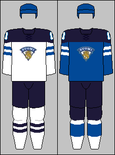
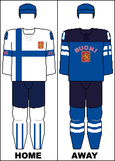
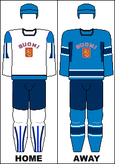

Retired jerseys[]
| No. | Player | Position | Career | Year of retirement |
|---|---|---|---|---|
| 5 | Timo Jutila | D | 1979–1999 | 2018 |
| 8 | Teemu Selänne | RW | 1987–2014 | 2015 |
| 11 | Saku Koivu | C | 1992–2014 | 2015 |
| 14 | Raimo Helminen | C | 1982–2008 | 2010 |
| 16 | Ville Peltonen | LW | 1991–2014 | 2015 |
| 17 | Jari Kurri | RW | 1977–1998 | 2007 |
| 26 | Jere Lehtinen | RW | 1992–2010 | 2015 |
| 44 | Kimmo Timonen | D | 1991–2015 | 2018 |
Notable players[]
- Keijo Kuusela 1948–1952
- Aarne Honkavaara 1948–1952
- Unto Wiitala 1949–1957
- Teppo Rastio 1954–1962
- Raimo Kilpiö 1957–1967
- Heino Pulli 1958–1965
- Matti Keinonen 1962–1973
- Urpo Ylönen 1963–1978
- Lasse Oksanen 1964–1977
- Lalli Partinen 1965–1973
- Esa Peltonen 1967–1980
- Veli-Pekka Ketola 1968–1981
- Heikki Riihiranta 1970–1976
- Juhani Tamminen 1970–1982
- Pekka Rautakallio 1972–1983
- Matti Hagman 1975–1987
- Reijo Ruotsalainen 1978–1989
- Kari Eloranta 1979–1992
- Jari Kurri 1979–1998
- Hannu Kamppuri 1981–1987
- Ilkka Sinisalo 1981–1983
- Petri Skriko 1982–1992
- Christian Ruuttu 1984–1996
- Timo Jutila 1983–1997
- Raimo Helminen 1983–2008
- Timo Blomqvist 1985–1992
- Jukka Tammi 1985–1998
- Esa Tikkanen 1985–2000
- Markus Ketterer 1987–1996
- Jarmo Myllys 1987–2001
- Janne Ojanen 1987–2002
- Teppo Numminen 1987–2006
- Jyrki Lumme 1988–2002
- Mika Nieminen 1991–1998
- Teemu Selänne 1991–2014
- Jere Lehtinen 1992–2010
- Saku Koivu 1993–2010
- Sami Kapanen 1994–2010
- Ville Peltonen 1994–2012
- Ari Sulander 1995–2003
- Janne Niinimaa 1995–2009
- Petteri Nummelin 1995–2010
- Kimmo Timonen 1996–2014
- Olli Jokinen 1997–2014
- Jarkko Ruutu 1998–2010
- Jere Karalahti 1998–2014
- Miikka Kiprusoff 1999–2010
- Sami Salo 2001–2014
- Niklas Hagman 2002–2013
- Ville Nieminen 2002–2006
- Mikko Koivu 2003–2016
- Jussi Jokinen 2003–2021
- Tuomo Ruutu 2004–2015
- Pekka Rinne 2004–
- Tuukka Rask 2005–
- Antti Pihlström 2008–
- Leo Komarov 2009–
- Valtteri Filppula 2010–
- Mikael Granlund 2010–
- Teuvo Teräväinen 2012–
- Marko Anttila 2013–
- Aleksander Barkov Jr. 2013–
- Olli Määttä 2014–
- Erik Haula 2014–
- Juuse Saros 2014–
- Sebastian Aho 2015–
- Mikko Rantanen 2015–
- Patrik Laine 2016–
- Eeli Tolvanen 2018–
- Miro Heiskanen 2018–
- Kaapo Kakko 2019–
- Anton Lundell 2021–
List of head coaches[]
- 1939–1941
- 1945–1946
- 1946–1949
- Risto Lindroos 1950–1954
- Aarne Honkavaara 1954–1959
- 1959–1960
- Derek Holmes 1960–1961
- Joe Wirkkunen 1961–1966
- Augustin "Gustav" Bubník 1966–1969
- Seppo Liitsola 1969–1972
- Len Lunde 1972–1973
- Kalevi Numminen 1973–1974
- Seppo Liitsola 1974–1976
- Lasse Heikkilä 1976–1977
- Kalevi Numminen 1977–1982
- Alpo Suhonen 1982–1986
- Rauno Korpi 1986–1987
- Pentti Matikainen 1987–1993
- Curt Lindström 1993–1997
- Hannu Aravirta 1997–2003
- Raimo Summanen 2003–2004
- Erkka Westerlund 2004–2007
- Doug Shedden 2007–2008
- Jukka Jalonen 2008–2013
- Erkka Westerlund 2013–2014
- Kari Jalonen 2014–2016[10]
- Lauri Marjamäki 2016–18[11]
- Jukka Jalonen 2018–[12]
References[]
- ^ "IIHF Men's World Ranking". IIHF. 6 June 2021. Retrieved 6 June 2021.
- ^ a b "Ice hockey: Selanne sets Olympic scoring record". Vancouver. 19 February 2010. Retrieved 10 March 2010.
- ^ a b "Selanne's 37th point tops Games mark". ESPN. Associated Press. 20 February 2010. Retrieved 27 September 2010.
- ^ Anrell, Lasse (14 May 2011). "Drömfinal". Aftonbladet (in Swedish). Retrieved 16 May 2011.
- ^ "Jääkiekossa unelmafinaali Leijonat–Tre Kronor". Helsingin Sanomat (in Finnish). Sanoma. 13 May 2011. Retrieved 16 May 2011.
- ^ Aykroyd, Lucas (15 May 2011). "It's gold for Finland!". IIHF. Archived from the original on 18 May 2011. Retrieved 16 May 2011.
- ^ Steiss, Adam. "2020 IIHF Ice Hockey World Championship cancelled". iihf.com. IIHF. Retrieved 21 March 2020.
- ^ "Leijonien MM-joukkue valittu – MM-kisat alkavat ensi perjantaina" (in Finnish). leijonat.fi. 15 May 2021.
- ^ "Team Roster Finland" (PDF). iihf.com. 21 May 2021.
- ^ "Jalonen Leijonien seuraava päävalmentaja". mtv3.fi (in Finnish). 7 June 2013. Retrieved 7 June 2013.
- ^ "IS: Marjamäki on Leijonien uusi päävalmentaja". mtv3.fi (in Finnish). 28 August 2015. Retrieved 28 August 2015.
- ^ "Jukka Jalonen palaa Leijonien päävalmentajaksi". iltalehti.fi (in Finnish). 4 October 2017. Retrieved 18 March 2018.
External links[]
- Finland men's national ice hockey team
- Ice hockey teams in Finland
- National ice hockey teams in Europe